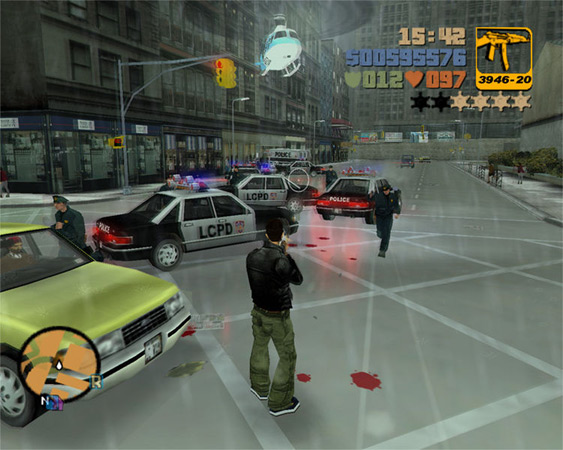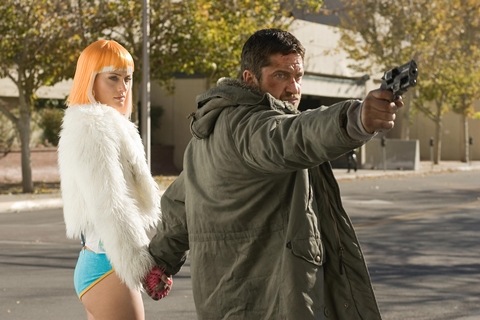Wreck-It Ralph is a sweet bit of nostalgia for the good ol’ days of gaming, those colorful characters and simple platformers of the arcade generation. But what about the movies for people who never stopped playing games? Current franchises Resident Evil and Silent Hill make enough bank to justify sequels that decline in quality and increase in 3-D, but the horror survival genre in general is popular. The fact that these movies are based on video games is practically incidental. Angelina Jolie donned tiny shorts and a Brit accent for Tomb Raider. And there’s a slew of films in pre-production limbo—Uncharted and Halo spring most readily to mind. But none of these movies capture the cultural zeitgeist of the next generation of gamer, the sandbox generation.
In fact, the best movies about today’s gamers—and tomorrow’s—aren’t based on existing video games at at.
And they’re certainly not brought to you by Disney.
 2001’s Grand Theft Auto III was a game-changer for the games industry. The open-world, completely immersive crime heist drama was a revolution, a cultural phenomenon, and the bane of parents and conservatives everywhere. Beyond the carjackings, the rampages, the refunds from prostitutes, Rockstar Studio’s flagship title changed expectations. No longer confined by a structured narrative this new breed of gamer wants big maps and a chance to choose their own adventure, for good or ill. In the early 2000’s any movie studio would’ve loved to option GTA III and cash in, but the franchise doesn’t have a Master Chief, a Nate Drake, or a Lara Croft. The player character of GTA III didn’t even have a name until three years later. (Bar trivia night pro-tip: it’s Claude.) No big name director would touch it.
2001’s Grand Theft Auto III was a game-changer for the games industry. The open-world, completely immersive crime heist drama was a revolution, a cultural phenomenon, and the bane of parents and conservatives everywhere. Beyond the carjackings, the rampages, the refunds from prostitutes, Rockstar Studio’s flagship title changed expectations. No longer confined by a structured narrative this new breed of gamer wants big maps and a chance to choose their own adventure, for good or ill. In the early 2000’s any movie studio would’ve loved to option GTA III and cash in, but the franchise doesn’t have a Master Chief, a Nate Drake, or a Lara Croft. The player character of GTA III didn’t even have a name until three years later. (Bar trivia night pro-tip: it’s Claude.) No big name director would touch it.
Crank is the best Grand Theft Auto movie that never was.
Made for gamers by gamers, writer-directors Brian Taylor and Mark Neveldine crammed as much sex, violence, and foul language into 93 minutes as humanly possible. The same goes for it’s even more frenetic sequel, Crank: High Voltage. The camerawork is instinctually familiar to gamers: scenes are frequently framed over the main character’s shoulder for a third-person P.O.V., there are several aerial shots of maps. And the assortment of oddball characters and D-list celebrity cameos are sublime, totally worthy of a Rockstar game. Are there drugs? Lots. Erection jokes? Check. Offensive racial stereotypes? Why, hello, David Carradine in yellowface. By rights, the series should be indefensible and yet Crank is still not as depraved as you are when playing Grand Theft Auto.
No small part of this comes from star Jason Statham punching, kicking, and winking his way through one of his best roles. Chev Chelios may be a hitman, but he’s never lobbed a grenade into a busy intersection for laughs. (Though there’s plenty of deadpan, twisted humor.) He’s too busy running from one level to the next, looking for power-ups in the form of adrenaline rushes and electric shocks. He may die at the end of each movie, but it never matters. Insert a new coin and try again, Chev.
The Crank series exists in a bubble of its own gleeful nihilism. But as ADD-addled as the movies are, there’s an undercurrent that points a (middle) finger at people looking to blame video games for a culture of violence. Check out the below dream sequence for a peek into Chev’s troubled childhood. Also take note of former Spice Girl Geri Halliwell as Chev’s mum. (Clip below NSFW for adult language.)
After the cult success of the Crank franchise, Neveldine/Taylor stepped back from their love of mega-violent video games to offer a critique. Gamer, released in 2009, is a Message Movie. And it suffers for it. While the sex and violence of their previous films are still there, the tone is much darker, played much straighter. Gerard Butler plays Kable, a death row inmate serving time as a human avatar in a hugely popular MMO first-person shooter called Slayers. Part Running Man, part Call of Duty, Kable’s kill-count makes him, and the teenage boy pulling his nano-strings, reality stars in a near-future America.

Americans are a sick lot in this dystopia. After Slayers, the next bestselling game is an RPG called Society, where the very poor or the very stupid “volunteer” to be sexbots under the control of pretty much the worst stereotypes of gamers imaginable. When the stand-in for your movie’s target audience is represented by a pasty, obese, slack-jawed creepster, it’s hard not to feel that more than just your intelligence is being insulted by watching Gamer. Keep in mind Gamer’s lynchpin scene, where Gerard Butler drinks a ton of booze so he can urinate and vomit into a car’s gas tank and drive to safety. Yeah.
The only bright spot in this murky mess is Michael C. Hall’s billionaire game programmer, Ken Castle. The former Broadway star gets to strut his stuff in what is possibly the best—and only—fight scene choreographed to Sammy Davis Jr..
Human-controlled avatars and nanotech are areas ripe for exploration. So is speculation about a future filled with people who grew up addicted to video games. It’s no stretch to imagine that the people and companies behind such technology could find their political clout, and naturally their corruption, increasing in step with their financial gains. Gamer is just not that story.
The face of gaming has changed. While the graphic, gritty content of today’s most popular games will most likely not inspire much nostalgia for a simpler era of carjackings and stealth kills, Crank and Gamer are snapshots of current fanbases, both real and percieved. The big three consoles have sold over a combined 230 million units worldwide. Add in PC, handheld, browser-based, and mobile games (one of the fastest-growing sectors) and you get a hell of a lot of people staring at screens.
Tomorrow’s gamers look like… anyone.
Theresa DeLucci is a regular contributor to Tor.com. She covers True Blood, Game of Thrones, and is also an avid gamer. She has also covered tech and TV for Geektress.com and Action Flick Chick. Follower her on Twitter @tdelucci










